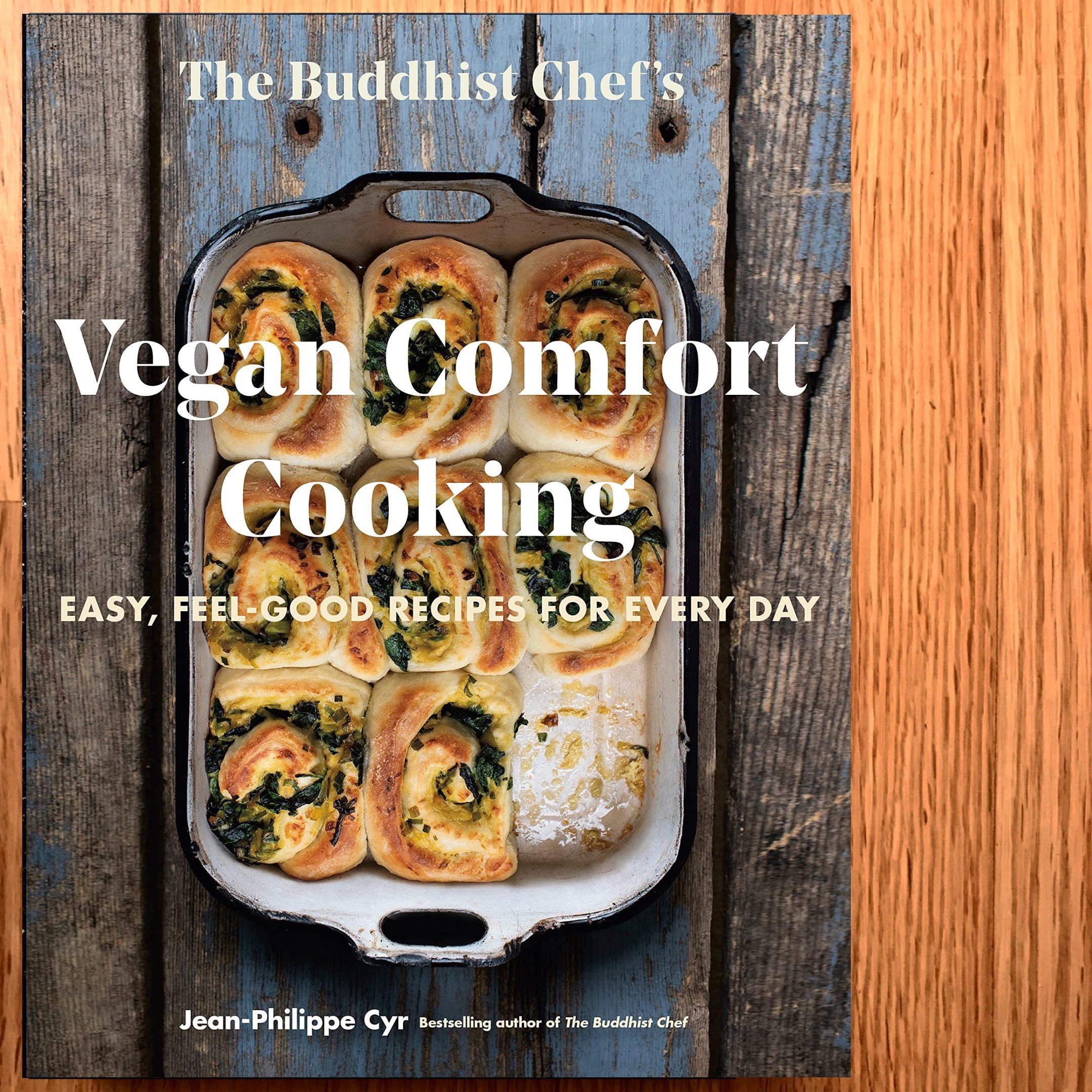By Meredith Grace Thompson
Vegan Comfort Cooking is very much what the title claims it to be. It is comfort made vegan; replicating non-vegan dishes using vegan ingredients so that the animal product non-consumer can enjoy the comfort of animal products without the ethical ramifications. Dishes such as meatballs, vegan Hamburger Helper, and burgers trail throughout the book. With an introduction and a breakdown of his pantry from self-proclaimed Buddhist chef Jean-Philippe Cyr, the book focuses very much on Cyr’s life, philosophy, and vegan food staples.
The recipes are laid out clearly and thoughtfully. Instructions are easy to follow, and results are consistent. The recipes themselves are strong enough to be adjusted slightly without losing their integrity. The physical book is a good size and stays open on the counter easily. It is full of bright photographs showing each dish’s completed look. Glossy photographs also feature Cyr, showing him to be a handsome white male who is clearly being used to sell this particular brand of whitewashed veganism and Buddhism—his relationship with Buddhism is highlighted several times throughout in a way that gives me pause. But more on that later.
In the same way that Gwyneth Paltrow’s Goop sells a particular product to a particular class of people, this book assumes a level of economic privilege. There is a clear attempt to make these meals easy and pantry ready, but the presupposition of a wealthy person’s pantry is difficult to miss. That being said, the meals were yummy and warm in that particular way only comfort food can be. The goal is clear, and it is reached. I would simply ask if the goal is worth reaching for.
The notion that food is not highly political is naïve to say the least. Within the confines of capitalism those who have access to veganism and to stylized healthy living are separated from those that do not. These lines are often racialized and always based on class. Western capitalism makes it incredibly difficult for those with lesser means to participate in this lifestyle. We actively discourage it, as a society. There are several levels of gatekeeping happening with this book which extend beyond the politicization of food into the fetishization of othered cultures and especially Eastern religions by white colonizers in order to sell themselves as somehow unique on a colonial, capitalistic stage.
I am speaking here not of individuals but rather of systems wherein culture is appropriated by dominant groups, scooping out the bits that are seen as desirable and leaving behind everything else, leaving cultures violated and torn apart. I don’t know Jean-Philippe Cyr personally. I know nothing about his relationship with Buddhism nor with veganism. But his self-identification as “the Buddhist Chef” feels morally bankrupt in that it is an aspect of cultural currency. What would he be without it? Simply “the chef”—a label far too vague to have individualistic claim. Unless of course you are Bruce Springsteen, a.k.a., “The Boss.”
I am also struck by the moral implications of a vegan diet heavily supplemented by soy. Cyr claims that we now “have a better understand of where our food comes from and how our dietary choices impact the planet.” And yet, he has chosen to write a book that features soy products to an alarming degree—soy products which are largely owned by the monopoly that is Monsanto, an unethical company that has routinely sued farmers for patent infringement when seeds have sprouted in their fields from transfer by wind.
Human beings are creatures of contradiction. Having been written by a performative and slightly oblivious person of immense privilege does not make Jean-Philippe Cyr’s book unworthy of reading, I don’t think. Try the leek rolls, they are amazing! But it brings to mind the essay of fabulous Oji-Cree-Salteaux writer jaye simpson, entitled “#whiteveganwitches” from Poetry is Dead Magazine issue 17: coven. I come back to this essay and again and again in my own thinking about colonialism, privilege, and capitalism. simpson states:
Let’s talk about white vegan witches for one moment. Let’s talk about the classism and layers of privilege to be able to practice veganism and witchcraft. Let’s talk about how these white witches shame people and women of colour for the use of animals in their diets and cultural practices.
Let’s talk about the inaccessibility of veganism and vegetarianism: how unstable food security is in POC communities due to systemic and societal racism.
The essay ends with an invitation to discuss; with an opening. This is where I would like to end also. I want to discuss this, and the way we digest cookbooks more generally. The way we allow our food to be controlled and the way that we attempt to control the food of others—whether that is by being vegan or by being against veganism. There is a lot to unpack here. But I do not believe that it can be so simple as to say one thing is invalid because the other is true.

